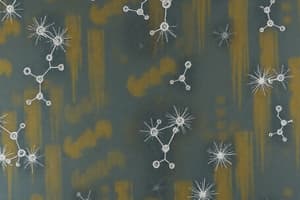Podcast
Questions and Answers
What is catenation in organic chemistry?
What is catenation in organic chemistry?
- The ability of carbon atoms to form long chains and rings by bonding with other carbon atoms (correct)
- The property of organic compounds to react with water molecules
- The reaction between carbon atoms and oxygen atoms in organic molecules
- The process of breaking down organic compounds into simpler molecules
How does catenation contribute to structural diversity in organic compounds?
How does catenation contribute to structural diversity in organic compounds?
- It allows for the creation of diverse structures ranging from simple chains to complex rings (correct)
- It reduces the variety of carbon-carbon bonds
- It weakens the bonds between carbon atoms
- It limits the formation of complex branched molecules
What is the significance of isomerism in organic compounds?
What is the significance of isomerism in organic compounds?
- It arises due to the structural diversity caused by catenation (correct)
- It results from the ability of carbon atoms to bond with hydrogen atoms
- It involves molecules with different molecular formulas but similar structural arrangements
- It leads to the formation of identical molecules with different properties
How do carbon-carbon bonds contribute to the stability of organic molecules?
How do carbon-carbon bonds contribute to the stability of organic molecules?
Why are carbon-carbon bonds crucial for the formation of large organic molecules necessary for life processes?
Why are carbon-carbon bonds crucial for the formation of large organic molecules necessary for life processes?
How does the variety of carbon-carbon bonds impact the structural diversity of organic compounds?
How does the variety of carbon-carbon bonds impact the structural diversity of organic compounds?
What property of carbon allows the formation of functional groups in organic molecules?
What property of carbon allows the formation of functional groups in organic molecules?
How do functional groups influence organic compounds?
How do functional groups influence organic compounds?
In biological systems, what role does carbon play in biomolecules?
In biological systems, what role does carbon play in biomolecules?
Which characteristic of carbon is fundamental to the richness and complexity of organic chemistry?
Which characteristic of carbon is fundamental to the richness and complexity of organic chemistry?
How does carbon contribute to the stability of organic compounds?
How does carbon contribute to the stability of organic compounds?
Why is carbon considered the central element in the study of organic chemistry?
Why is carbon considered the central element in the study of organic chemistry?
Flashcards are hidden until you start studying
Study Notes
Carbon's Unique Properties
- Carbon's ability to bond with various elements such as hydrogen, oxygen, nitrogen, and halogens enhances the versatility of organic compounds.
- Carbon's catenation property enables the formation of functional groups in organic molecules, which determine the chemical properties and reactivity of a compound.
Functional Groups
- Functional groups are specific arrangements of atoms that impart distinct characteristics to organic compounds, influencing their behavior in chemical reactions.
Biological Significance
- Carbon's catenation plays a crucial role in the formation of biomolecules such as carbohydrates, lipids, proteins, and nucleic acids.
- The intricate structures of biomolecules are based on carbon's ability to form diverse bonds and configurations, essential for life processes.
Structural Diversity
- Carbon's ability to form strong covalent bonds with other carbon atoms allows for the creation of diverse structures, ranging from simple linear chains to complex branched molecules and intricate ring systems.
- The variety of carbon-carbon bonds (single, double, and triple bonds) further enhances the structural diversity of organic compounds.
Isomerism
- Catenation leads to the phenomenon of isomerism in organic compounds, resulting in molecules with the same molecular formula but different structural arrangements.
- This structural diversity resulting from catenation gives rise to a vast number of isomeric forms, each with unique properties and reactivity.
Stability and Versatility
- Carbon-carbon bonds are strong and stable, contributing to the overall stability of organic molecules.
- This stability allows for the formation of complex and large organic molecules essential for life processes.
Studying That Suits You
Use AI to generate personalized quizzes and flashcards to suit your learning preferences.




